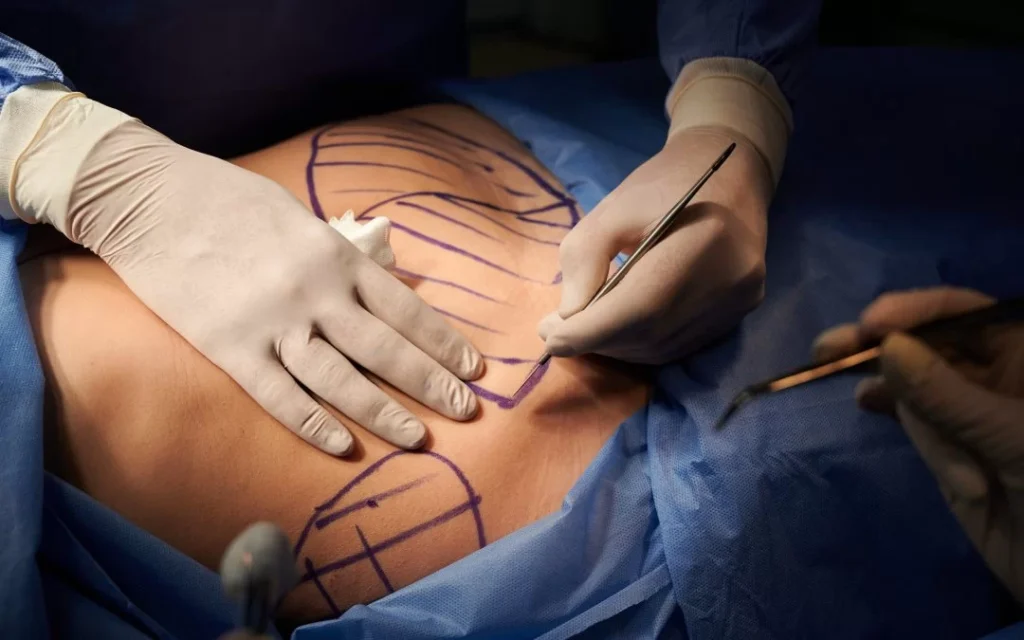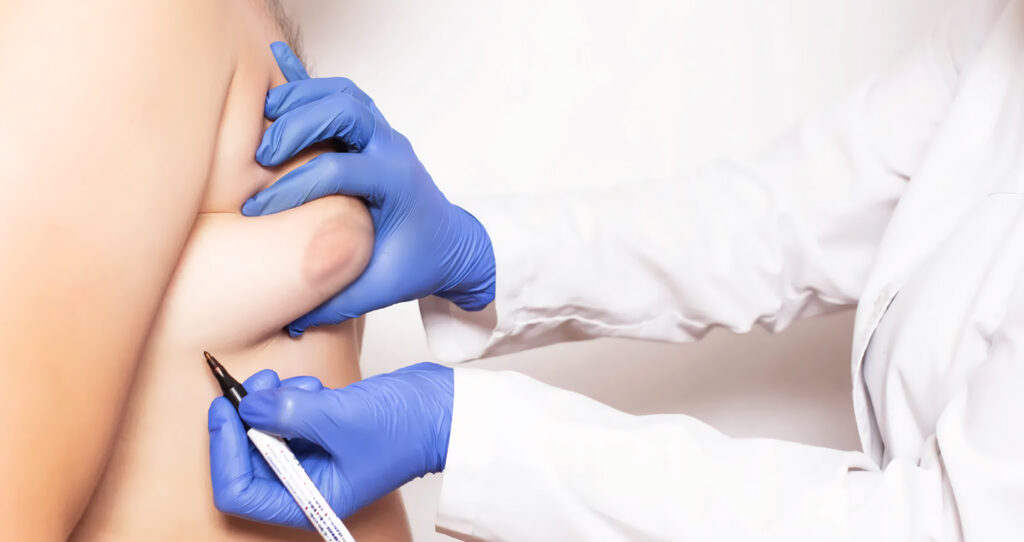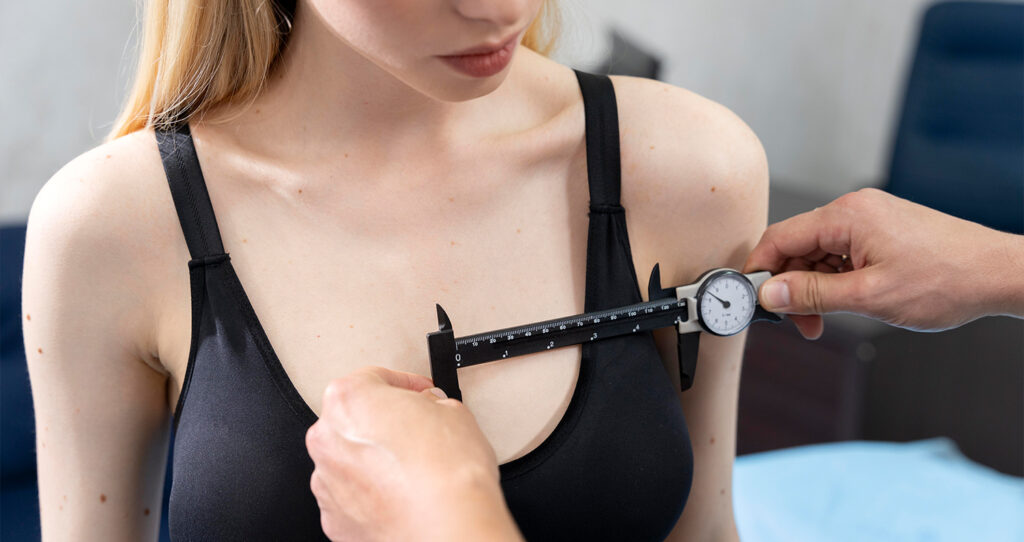Are you considering a tummy tuck to achieve the body you’ve always dreamed of? Whether you’re just curious or have already scheduled your surgery, understanding every facet of abdominoplasty before and after is crucial.
This article is your key to understanding every aspect of the procedure. With the help of plastic surgeon Dr. Al Shehab, we’ll walk you through what to expect before and after the surgery, help you set realistic goals, guide you through the recovery process, and make you aware of any potential risks and complications.
What is Abdominoplasty?
Abdominoplasty, commonly referred to as a “tummy tuck,” is a surgical procedure designed to address the issue of sagging skin in the abdominal region.
Excess skin in the abdominal area can be a common concern for various reasons.
It often occurs in individuals who have experienced significant fluctuations in body weight, such as those who have gained and then lost a substantial amount of weight. This process can stretch the skin, and when the weight is lost, the skin may not fully retract, leading to the development of loose skin [1, 2].
Pregnancy is another major factor contributing to abdominal skin changes. During pregnancy, the abdominal skin stretches to accommodate the growing baby. After childbirth, the skin may not return to its original state, and it can become lax and saggy.

Aging plays a significant role as well. As we’re older, our skin loses its natural elasticity, which makes it more likely to sag.
The main objective of abdominoplasty is to eliminate this surplus skin, resulting in a flatter and more aesthetically pleasing abdominal profile. However, the procedure goes beyond just removing excess skin. It also involves tightening the underlying abdominal muscles that may have become stretched or separated, further enhancing the contour. In some instances, limited fat removal may be performed, but the primary focus is on addressing skin and muscle issues.
Realistic Expectations for Tummy Tuck Surgery
Among the many transformative procedures available, the abdominoplasty stands out as a great option, offering a multitude of benefits such as:
- Removing excess skin from the abdominal area
- Tightening and recontouring the abdominal muscles
- Reshaping and improving the aesthetics of the belly button

Patients are usually very happy with their exceptional outcomes. However, this operation has certain limitations, and people should have reasonable expectations. Here are some things to keep in mind:
- Visible scarring
Abdominoplasty uses an invasive approach, requiring an incision that typically extends from hip to hip. The result is a horizontal scar on the lower abdomen. While surgeons aim to minimize scarring, it is an inherent part of the procedure.
- Not a weight-loss solution
While it can effectively remove excess skin and provide a slimmer appearance, it does not have a substantial impact on fat reduction. In fact, the amount of fat removed during a tummy tuck is typically minimal, around 1-2 kilograms at most.
In our article, we’ll delve deeper into the intricacies of this procedure and provide side-by-side comparisons of before and after photos, allowing you to make a well-informed decision.
- Recovery time
Many individuals underestimate the recovery period associated with a tummy tuck. Patients can usually think about going back to work after at least two weeks. If the procedure is combined with liposuction or other surgeries, this timeline may be lengthened.
Abdominoplasty: Before and After Pictures
Before undergoing any surgical procedure, it’s essential to be well-informed and have realistic expectations regarding the potential outcomes. One of the ways to gain insight into the effects of tummy tuck is by reviewing before and after photos.
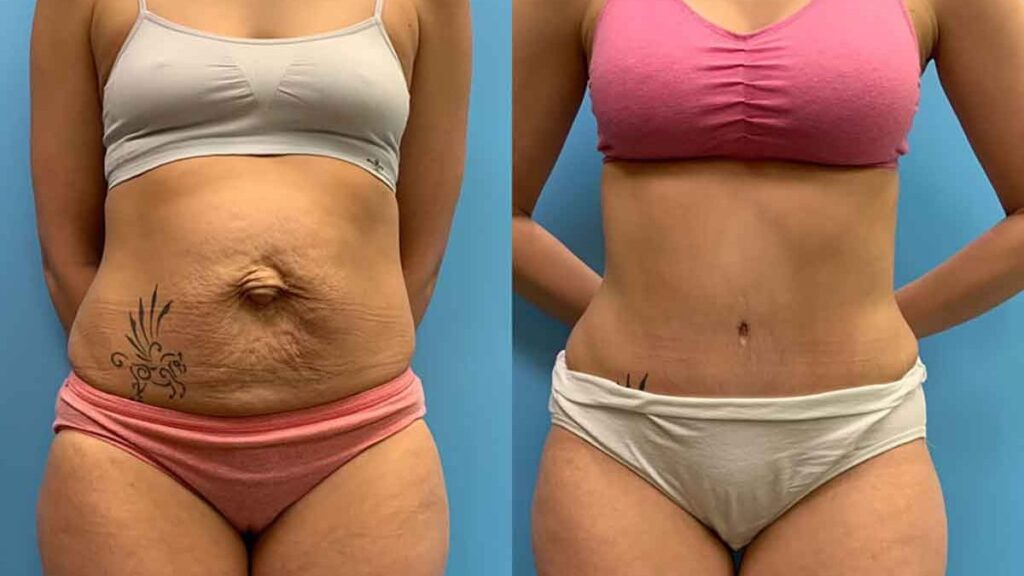

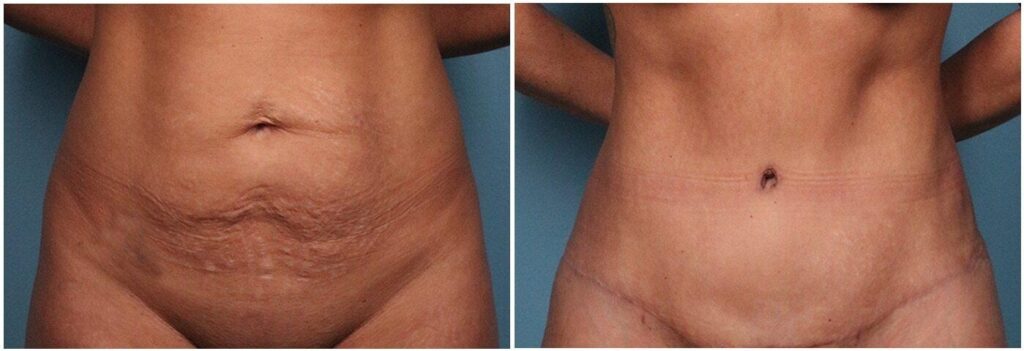
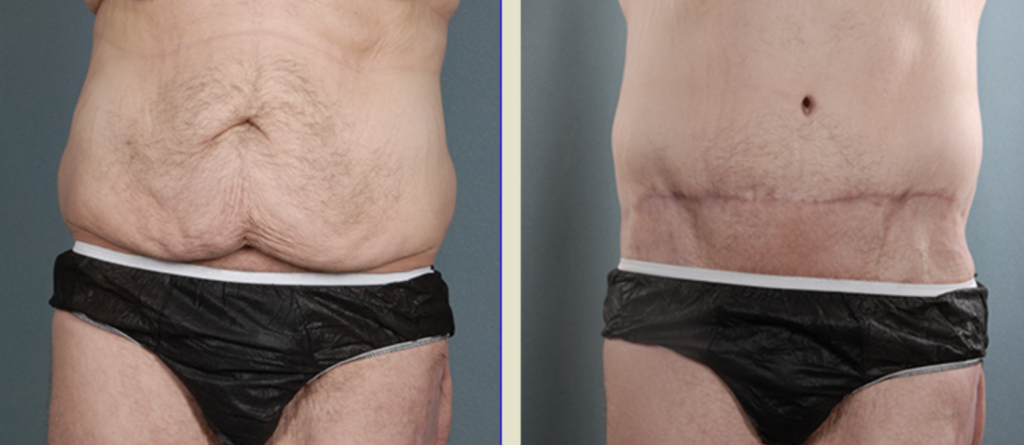
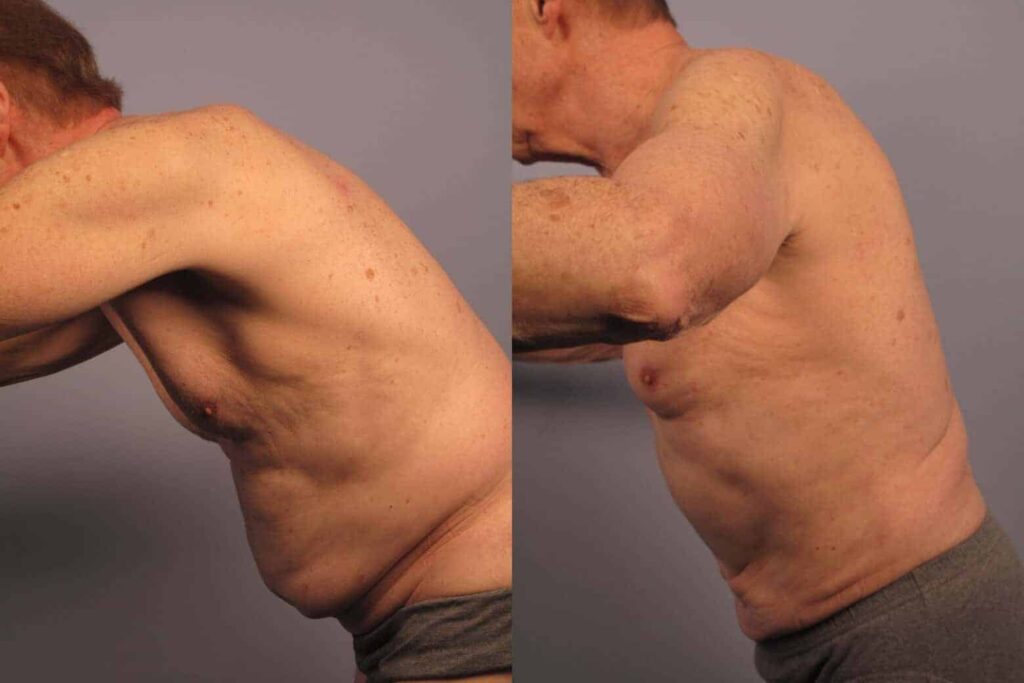
Recovery Period and Maintaining Results
Maintaining the results of abdominoplasty is not just about the immediate recovery period but also about adopting a post-surgical lifestyle that ensures the longevity of the benefits. Together with Dr. Al Shehab, a seasoned surgeon, we provide valuable guidance on both the recovery process and the steps you can take to preserve your results.
- A key aspect of recovery is wearing a compression garment.
This specialized clothing helps reduce swelling and supports the treated area for eight weeks after surgery.
Dr. Al Shehab advises customizing the compression garment with surgical foam. This combination ensures that the skin heals smoothly, without any dents or wrinkles, giving you a more even and natural appearance.
- Lymphatic drainage is another vital element in the post-operative phase [3].
Starting about a week after the surgery, patients are recommended to undergo ten sessions of lymphatic drainage, each lasting an hour. This massage technique is specifically designed to reduce swelling, improve lymph circulation, and promote optimal healing.
By facilitating the body’s natural recovery processes, lymphatic drainage can contribute significantly to the quality and durability of your results.

- While the initial recovery period may restrict physical activity, patients are typically allowed to gradually reintroduce exercise after about four weeks.
This step is crucial for maintaining the results over the long term. Exercise not only helps to sustain the improvements made during the surgery but also contributes to overall health and well-being. It’s important to follow your surgeon’s advice on the appropriate exercise routine to avoid complications.
- Healthy lifestyle choices also extend to refraining from smoking and drinking for a specific period, as advised by your surgeon.
Smoking, in particular, can hinder blood circulation and impede the healing process, while alcohol can interfere with the body’s natural recovery mechanisms.
- Reducing post-operative stress is important for overall well-being and can positively impact your recovery.
Stress can lead to inflammation, which may slow down the healing process. Engage in relaxation techniques such as meditation, deep breathing exercises, or activities you find enjoyable to help manage this condition.
Every patient’s experience is unique, and individual results are influenced by various factors. Therefore, it is essential to consult with your surgeon for personalized guidance and recommendations specific to your situation.

Risks and Considerations
Abdominoplasty, in general, is a safe procedure that can yield transformative results. It’s important for patients not to be unduly concerned but rather informed about potential risks and complications that can be effectively managed and prevented. These include:
- Complications in wound healing
Patients should be aware that complications in wound healing, though uncommon, can arise, particularly in those who smoke or consume alcohol. Proper postoperative care is crucial in preventing and managing these issues.
- Infections
Infections, while relatively rare, are a recognized concern post-abdominoplasty. Diligent postoperative care and the use of antibiotics are key factors in their prevention and management.
- Seroma considerations
- Scarring
As we’ve mentioned before, scarring is an inherent aspect of abdominoplasty.
While the type of sutures used is consistent for all patients, the way an individual’s skin heals can vary. Some patients may develop thin and inconspicuous scars, while others might experience hypertrophic or keloid scarring, where the scar becomes thick and raised.
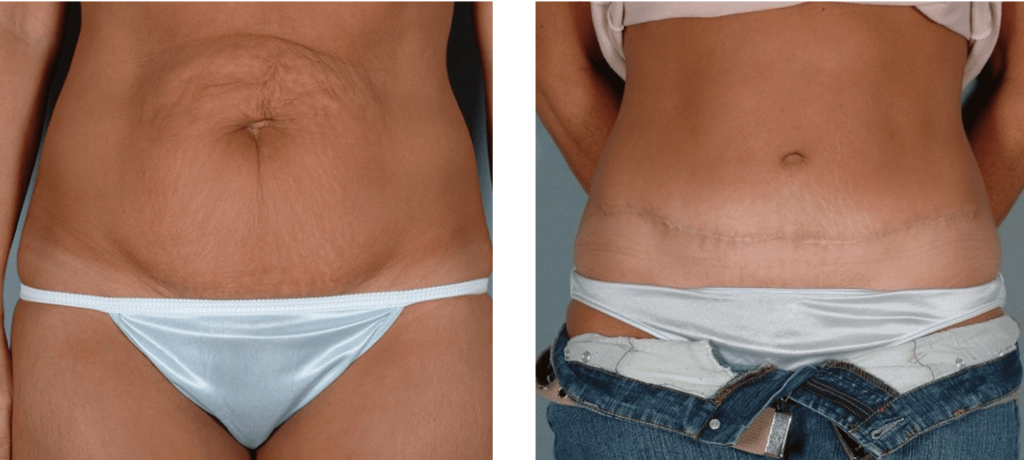
Nowadays, modern surgical techniques and careful postoperative scar management can help ensure that the resulting scars are as inconspicuous as possible [5].
Cost of Abdominoplasty
The cost of abdominoplasty can vary based on several factors, including the location of the surgery, the surgeon’s expertise, the extent of the procedure, and any additional services provided. Let’s look at these points in more detail.
🏥 Location
Location plays a crucial role in cost. Different countries have different pricing structures for cosmetic procedures, influenced by factors such as the local cost of living, healthcare regulations, etc.
👨🏻⚕️ Surgeon experience
The cost of abdominoplasty can also be influenced by the experience and reputation of the surgeon performing the procedure. Generally, a more skilled and well-regarded surgeon may charge a higher fee for their services.
🔄 Combination procedures
Some patients may opt to combine their abdominoplasty with other cosmetic surgeries, such as liposuction, breast augmentation, or a Brazilian Butt Lift (BBL).
Combining surgeries can save money compared to having them done separately. But it can also make the surgical plan more complicated and affect the overall cost.
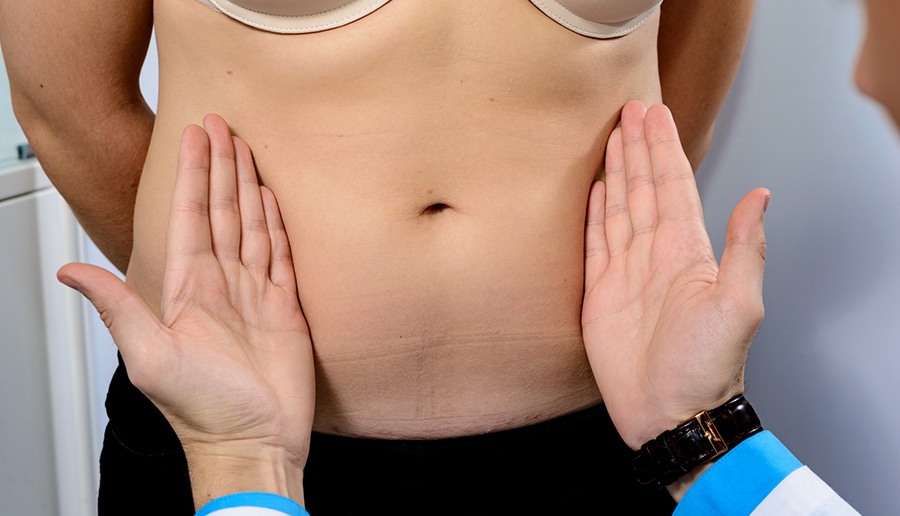
📍 In addition to the cost of surgery, patients should also budget for pre-operative examinations, post-operative check-ups, and any specialized attire or medications required after the procedure.
Summary
Abdominoplasty is a transformative surgical procedure that can provide amazing results for individuals seeking to improve the appearance of their belly area. However, it is essential to approach this surgery with realistic expectations and a thorough understanding of the process, as well as the potential risks involved.
We have also included tummy tuck before and after photos to provide you with a visual understanding. These images can serve as a valuable reference point, showcasing the transformations that are possible through this procedure. But, remember to discuss your specific goals and concerns with a plastic surgeon, who can provide personalized guidance tailored to your unique situation.
FAQ
🤓 What is abdominoplasty, and who is an ideal candidate for the procedure?
Abdominoplasty is a surgical procedure designed to reshape and firm the abdomen. Ideal candidates for this surgery are individuals who have excess abdominal skin and stretched muscles. It is often recommended for those who have experienced significant weight loss, pregnancy, or have loose skin due to aging.
📊 What can I expect from the before and after results of abdominoplasty?
Before and after photos provide a visual representation of the changes that abdominoplasty can achieve. Usually, you can expect a flatter and more toned abdominal area with improved skin tightness and muscle definition. However, individual results vary based on unique circumstances.
🌟 What are some tips for maintaining the results of abdominoplasty?
To maintain the results, it’s important to lead a healthy lifestyle, including regular exercise and a balanced diet. Staying within a stable weight range is crucial, as significant weight fluctuations can impact the outcome. Additionally, keeping your skin well-hydrated and protected from the sun can contribute to the longevity of the results.
⚠️ What are the risks and potential complications associated with abdominoplasty?
Like any surgical procedure, abdominoplasty carries risks, which can include infection, scarring, blood clots, and some complementation in wound healing.
References
- Stuerz K, Piza H, Kinzl JF. The impact of abdominoplasty after massive weight loss: a qualitative study. Ann Plast Surg. 2013 Nov;71(5):547-9. doi: 10.1097/SAP.0b013e3182503b11. PMID: 23187713.
- Staalesen T, Elander A, Strandell A, Bergh C. A systematic review of outcomes of abdominoplasty. J Plast Surg Hand Surg. 2012 Sep;46(3-4):139-44. doi: 10.3109/2000656X.2012.683794. Epub 2012 Jul 2. PMID: 22747350.
- Marxen T, Shauly O, Goel P, Tsan T, Faria R, Gould DJ. The Utility of Lymphatic Massage in Cosmetic Procedures. Aesthet Surg J Open Forum. 2023 Feb 28;5:ojad023. doi: 10.1093/asjof/ojad023. PMID: 36998743; PMCID: PMC10045879.
- Neaman, Keith C. M.D.; Armstrong, Shannon D. M.D.; Baca, Marissa E. M.D.; Albert, Mark M.D.; Vander Woude, Douglas L. M.D.; Renucci, John D. M.D.. Outcomes of Traditional Cosmetic Abdominoplasty in a Community Setting: A Retrospective Analysis of 1008 Patients. Plastic and Reconstructive Surgery 131(3):p 403e-410e, March 2013. | DOI: 10.1097/PRS.0b013e31827c6fc3.
- Palao R, Gallego-Escuredo JM, Bohbot S. Postabdominoplasty Scar Improvement after a Single Session with an Automated 1210-nm Laser. Plast Reconstr Surg Glob Open. 2023 Mar 10;11(3):e4866. doi: 10.1097/GOX.0000000000004866. PMID: 36910728; PMCID: PMC10005831.

